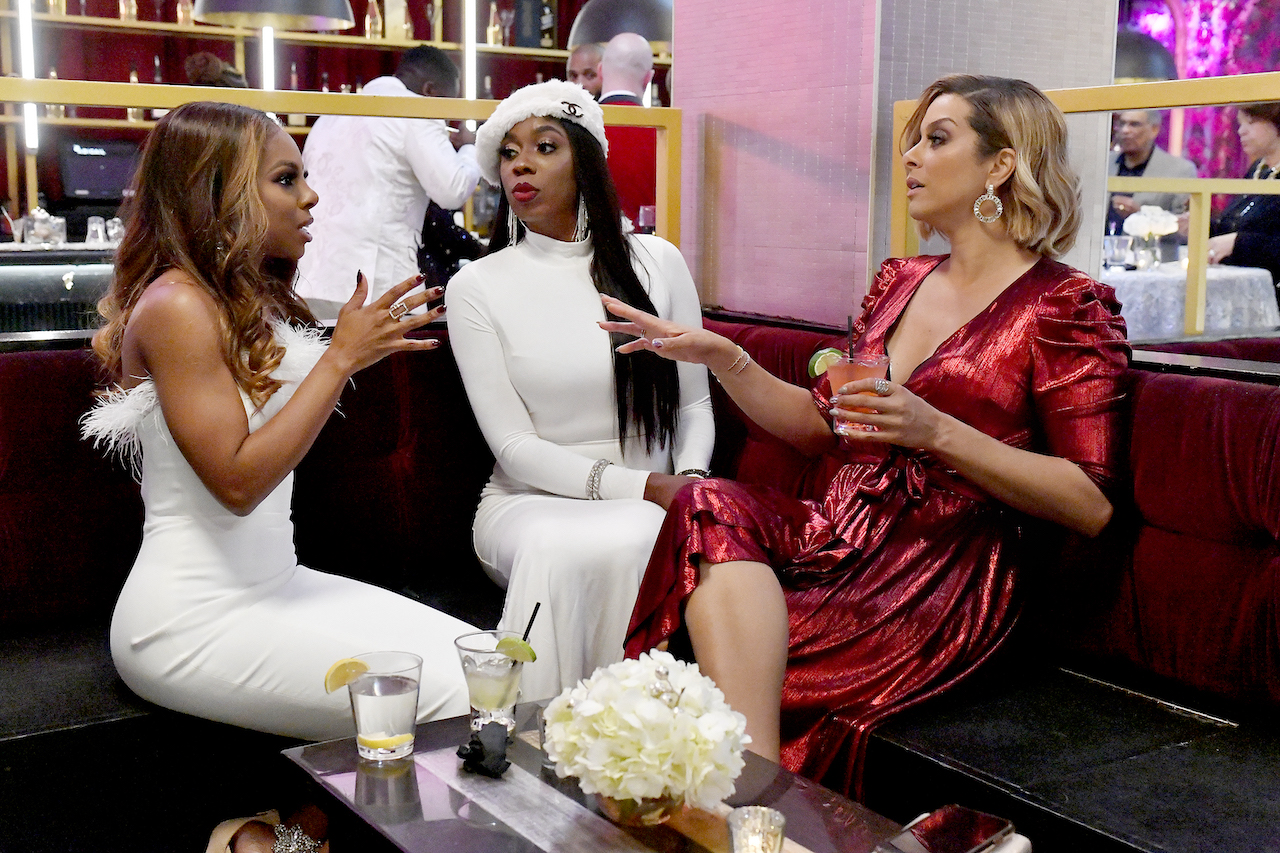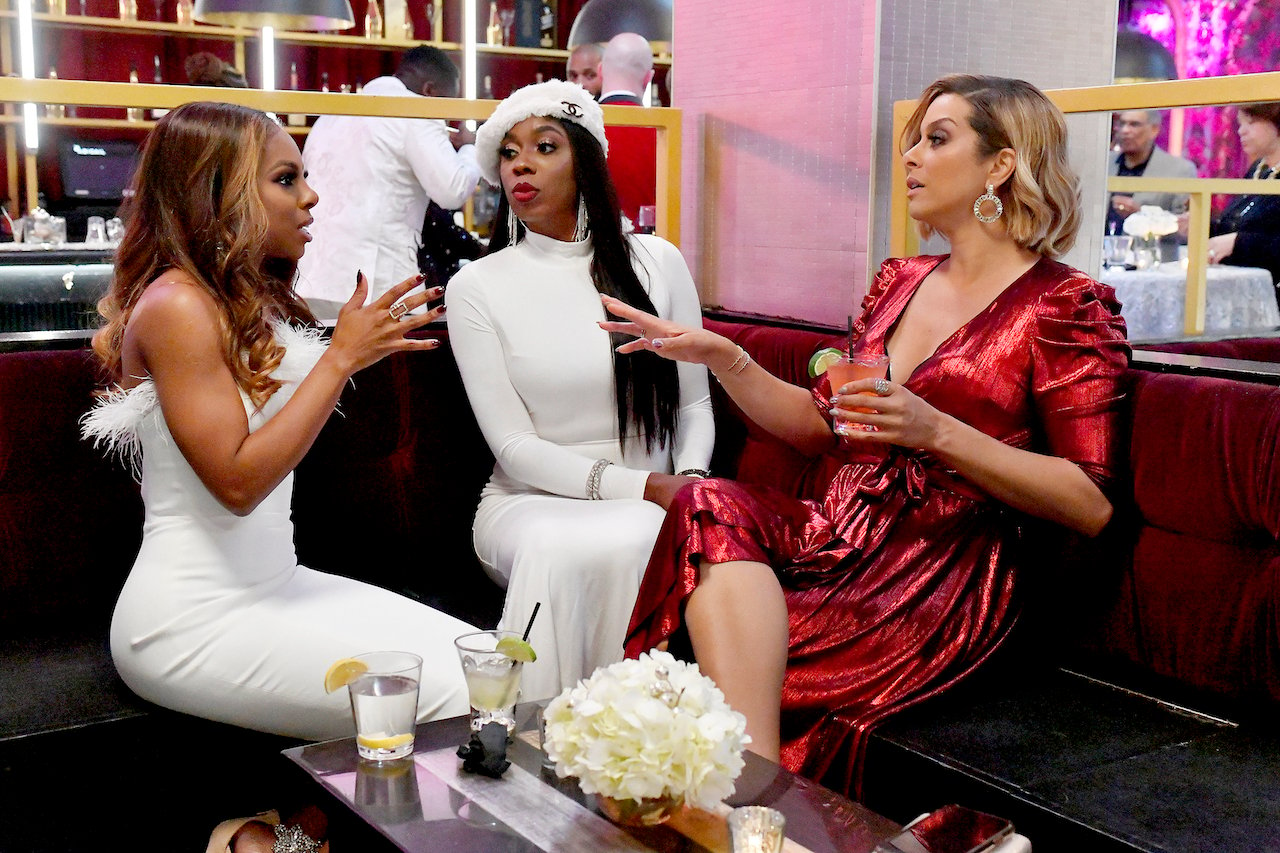
‘RHOP’: Here’s How Colorism Excuses Robyn Dixon’s Aggressive Behavior
While drama on The Real Housewives of Potomac is nothing new, stars of the show and viewers are noticing an imbalance in how cast members are held accountable for outbursts. Candiace Dillard Bassett is arguably the most controversial star of the show. Fans have a love/hate affinity for her witty clap backs, which some say she takes too far. But Dillard Bassett says the audience, and sometimes others involved in the show, view her as the aggressor because of colorism.
The issue of colorism is a complex one, especially when talking about reality stars who are typically exploited and rewarded. But Dillard Bassett may not be wrong in her observation. And an example is close to home. Look no further than Robyn Dixon.

As one-half of the self-proclaimed green-eyed bandits alongside her BFF Gizelle Bryant, Dixon is known to stir the pot. But day one fans of the show also know that she’s not afraid to get in someone’s face, and she’s done so on a number of occasions.
The conversation about Dillard Bassett being held to a certain standard versus her co-stars who’ve had similar or worse behavior has been a trending topic on social media. And now, viewers are starting to dig deeper into Dillard Bassett’s colorism claims, especially when analyzing Dixon’s actions.
What is colorism?
According to the National Coalition of Christians and Jews, colorism is defined as “a practice of discrimination by which those with lighter skin are treated more favorably than those with darker skin. This practice is a product of racism in the United States, in that it upholds the white standards of beauty and benefits white people in the institutions of oppression (media, medical world, etc.).”
There are several reasons why colorism exists, and it’s embedded in racism. Dating back to slavery, lighter-skinned slaves were treated better than darker-skinned slaves and were granted “special privileges.” Some privileges included lighter-skinned slaves being welcomed in the main house by their slave masters, better job opportunities, and being fed better food – while the darker-skinned slaves were seemingly given harsher punishments and worked more difficult labor. Lighter-skinned slaves were often favored because they were products of rape from their slave masters and co.
Moving onto the 19th and 20th centuries, the “paper bag test” was often utilized in Black spaces and in the hiring of Black employees, and severely impacted hiring practices. Moreso, there’s a history of darker-skinned Black people being viewed as a threat, physically and metaphorically, and the images we see on screen impact such.
Colorism has continued to sneak in via unimaginable ways, even within the entertainment space. Oftentimes, lighter-skinned celebrities are favored or given better roles in film and television projects, promoted more in music, and allowed passes for bad behavior. And RHOP cast members are not exempt.
Candiace Dillard Bassett has been vocal about feeling she’s a victim of colorism, while her lighter-skinned co-stars don’t receive blowback
For RHOP fans, it’s no secret that Dillard Bassett’s shade and timing can hit hard. She’s been accused of hitting below the belt and saying the most vile insults during verbal spats with her co-stars, and has gotten into physical altercations. But her reactions are not uncommon. As she said during the Season 6 reunion special while confronted by Andy Cohen over her behavior on the show and on Twitter, “Welcome to the stage.” This is what Housewives are famous for.
But while Dillard Bassett is continuously reprimanded, her lighter-skinned co-stars and other Bravolebrities of a lighter skin tone or who are not of color, get a pass. She’s used Ashley Darby as an example of a co-star who is not held on the same level for her messy ways. Since the start of the show, Darby has been at the center of drama amongst co-stars, spreading rumors, holding shady confessionals, and beyond.
In a recent interview with The Daily Beast, Dillard Bassett once again spoke to the idea that colorism is the reason why. She explained:
When I first joined this cast and would get into whatever disagreement with my cast, my first inclination was not to go right to colorism. I didn’t want to believe that right away. But it just became so clear when the audience wants to vilify me. And let’s say someone like Ashley is responding or reacting in a very similar way. Somehow, when I do it, it’s aggressive. And when Ashley does it, it’s, you know…she’s praised for being messy. And I am maligned and banished to the basement. And I will be clear in saying that I believe that most of the colorism that we experience comes from an audience space. I don’t believe that my cast is purposely or willingly wielding any power against us.
Robyn Dixon has a history of aggressive behavior toward her co-stars
While Darby and Dillard have had the most issues, one lighter-skinned co-star that has been on the same par of “aggression” in her actions and reactions is Dixon, though none have been against Dillard. In earlier seasons, Dixon and Darby clashed due to Darby continuing to speak about Dixon’s unconventional relationship.
In one scene, Dixon confronts Darby at her now-closed Virginia restaurant about her actions, and things nearly become physical when Dixon physically intimidates Darby by getting in her face and using her body and hands during the confrontation. Darby requests Dixon gets out of her face multiple times, and Bryant has to move Dixon. In a separate scene, Dixon screams across the table at Darby regarding the same manner.
In Season 4, Dixon charges at Monique Samuels during a verbal argument. While standing in close proximity, Samuels threatens Dixon with an umbrella as a means to remove Dixon from her personal space.
As Season 7 progresses, Dixon has turned up the ante. In episode 4, she confronts Wendy Osefo over a comment she heard Osefo make and charges at her when Osefo tells her to stand on her words as a way to prove she stands firm in her beliefs. Osefo demands that Dixon sit down and stop walking toward her.
Fans begin to call out Robyn Dixon’s behavior
Following Dixon’s explosive outburst toward Osefo in S7, Ep. 4, fans were floored. And with the preview of what’s to come next during a dinner table scene where she yells obscenities at Osefo, fans have begun to discuss Dixon’s antics. Furthermore, things are coming full circle with Dillard Bassett’s colorism claims, and viewers are starting to take notice. A larger discussion of the double standard of accountability between Dillard’s behavior and her co-stars has been taking place on social media.
“Whispers “If you did some research instead of waiting to use the colorism card you would see,” one fan wrote on Twitter, while adding, “Look up “Robyn Dixon aggressive” on Twitter & you will see that she is labeled aggressive by many. Or does she need to get the label from a white man for it to matter?”
Another chimed in, “Can we finally have the “Robyn is aggressive” conversation once and for all?? How many times do we need to see it to believe? Certain girls don’t get this kind of grace.”
One fan added: “I don’t like this side off [sic] Robyn. If Wendy would’ve been yelling at her, she would’ve been labeled as aggressive. Talk about light-skin privilege.”


